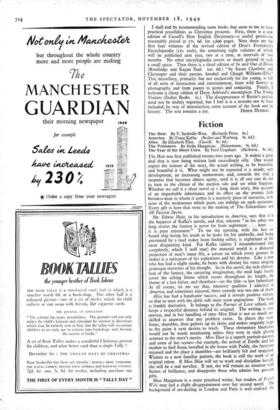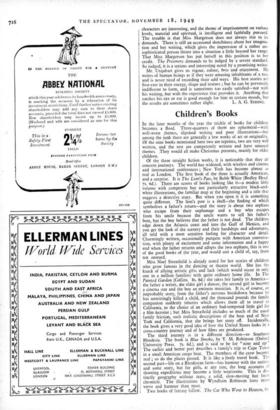Fiction
The Heir. By V. Sackville-West. (Richards Press. 6s.) America. By Franz Kafka. (Seater and Warburg. 9s. 6d.) Mice. By Elizabeth Eliot. (Cassell. 8s. 6d.) The Prisoners. By Stella Margetson. (Heinemann. 9s. 6d.) The Year of the Short Corn. By Fred Urquhart. (Methuen. 9s. 6d.)
The Heir was first published twenty-two years ago. It makes a great deal that is now being written look exceedingly silly. One would expect the texture of the story, the actual writing, to be beautiful, and beautiful it is. What might not be expected is a steady, sure development, an increasing momentum, and, towards the end, a Suspense that becomes almost agony, until it is all one can do not to turn to the climax of the auction sale and see what happens. Whether we call it a short novel or P long short story, this account of an improbable inheritance and its effect on the prosaic little business-man to whom it comes is a masterly piece of narrative, with none of the weaknesses which poets can indulge on such occasions. Every gift is here that went to the making of The Edwardians and All Passion Spent. Mr. Edwin Muir, in his introduction to America, says that it is the happiest of Kafka's novels, and that, whereas " in his other two long stories the fantasy is never far from nightmare . . . here . . • it is pure enjoyment." To me the opening, with the boy on board ship losing his trunk as he looks for his umbrella, and being prevented by a mad stoker from finding either, is nightmare of the most disquieting kind. For Kafka (unless I misunderstand him completely, which I well may) the material world is a distorted projection of man's inner life, a screen on which every gesture he makes is a caricature of his aspirations and his dreams. Like a man who has had a slight stroke, he hears with dismay his voice uttering grotesque travesties of his thought. So in this novel, the rich elabora- tion of the fantasy, the careering imagination, the mad logic barely cover the aching theme which recurs throughout its length, the theme of a lost father, and therefore—see the title—a lost fatherland. At all events, let me say that, whatever qualities I admired in America, and sometimes enjoyed, sheer comedy was not one of them. Alice has had a handsome success, and it reveals positive virtues, so that to start with the debit side must seem ungracious. The book is frankly derivative. It belongs to the Pursuit of Love school, and keeps a respectful distance behind its original. The writing is very uneven, and in her handling of time Miss Eliot is not so much un- skilled as unaware that any problem exists. In places the storY limps, shambles, then gathers up its skirts and makes ungainly leaps to the point it next desires to reach. These elementary blemishes would not be worth mentioning unless they were in such glaring contrast to the story's merits. Miss Eliot is a superb portrait-painter, and some of her scenes—for example, the arrival of Estelle and her mother to find Sonia installed in the house with Paddy, the furniture misused and the place a shambles—are brilliantly felt and imagined. Written to a now familiar pattern, the book is still the work of an original talent. If Miss Eliot will set to work and discipline herself, she will be a real novelist. If not, she will remain an amateur with flashes of brilliance, and disappoint those who admire her genuine gifts. Miss Margetson is a more practised writer, but readers of Peter's Wife may feel a slight disappointment over her second novel. The background of art-dealing in London and Paris is well realised, the
characters arc interesting, and the theme of imprisonment on various levels, material and spiritual, is intelligent and faithfully pursued. The trouble is that Miss Margetson does not always rise to its demands. There is still an occasional sketchiness about her imagina- tion and her writing, which gives the impression of a rather un- sophisticated person thrust into a situation a little beyond her range. That Miss Margetson has put herself in this position is to her credit. The Prisoners demands to be judged by a severe standard. So judged, it is a serious and interesting novel by a promising writer.
Mr. Urquhart gives us vigour, colour, brio and enjoyment. He writes of human beings as if they were amusing inhabitants of a zoo, and is never tired of recording their odd ways. His best stories are first-rate in their energy, shape and texture ; but he can be perversely indifferent to form, and is sometimes too easily satisfied—not with his writing, but with the experience that provokes it. Anything that catches his eye or car is good enough for him in certain moods, but
the results are sometimes rather slight. L. A. G. STRONG.















































































 Previous page
Previous page